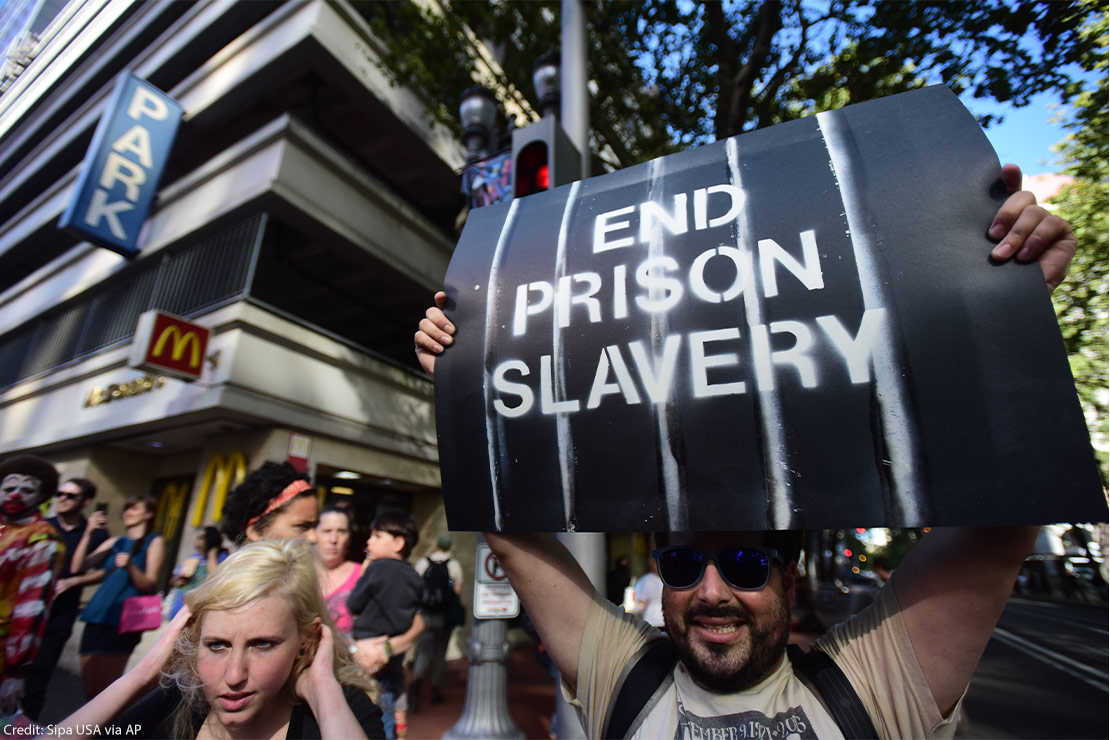
Voters across the political spectrum want their elected officials to support bold criminal justice reforms that reduce punishment and mass incarceration — according to polling conducted just before the midterms. Despite an aggressive, tough-on-crime campaign playbook from some candidates who attempted to manipulate crime as a wedge issue, voters largely chose justice anyway. Although not all reform initiatives on the ballot were successful, voters drove significant progress on several issues, including prison labor reform, drug policy, and prosecutorial reform.
Here are three major highlights from the midterm elections and what they mean for the future of criminal legal reform.
Voters banned slavery from state constitutions, redefining prison labor.

More than 150 years after slavery was abolished, four states — Alabama, Oregon, Tennessee, and Vermont — voted to eliminate language in their constitutions that allows slavery as punishment for a crime, an exception written into the 13th Amendment.
The success of these measures indicates growing support for prison reform in a country where roughly 800,000 incarcerated people work, and are often forced to do so for little to no pay. These amendments are needed to strip antiquated language from state constitutions and transform the criminal justice system by making all prison work voluntary. For far too long, incarcerated people have been exploited for their labor, making pennies on the dollar. These victories pave the way for ending modern-day forced labor in prisons and jails nationwide.
Voters chipped away at the war on drugs.
After this year’s midterms, 21 states have now legalized marijuana; the tide for legalization and decriminalization nationwide only continues to grow. Voters in Maryland legalized marijuana, including an automatic expungement provision for clearing past marijuana possession convictions, which will improve people’s lives so they aren’t saddled with a criminal record. And despite drug policy losses in Arkansas, North Dakota, and South Dakota, there were still many important victories in places where voters increasingly lean conservative. Missouri legalized marijuana, and five Texas cities plus five Ohio cities decriminalized marijuana possession locally. Wisconsin voters also approved marijuana ballot questions in three counties and five municipalities across the state, paving the way for future legalization.
These victories build upon promising results from past election cycles, where states that are more politically conservative — including Maine, Virginia, New Mexico, Alaska, Montana and Arizona — have passed marijuana legalization. This wave of wins not only highlights the increasingly bipartisan support for addressing significant racial bias in marijuana arrests, but also provides a stronger case for legalizing and decriminalizing marijuana at the federal level. Marijuana legalization and expungement of past marijuana convictions are both necessary to remedy racial disparities and racial harms of the war on drugs.
In Colorado, voters approved a measure that decriminalizes the use of certain psychedelic drugs, which are becoming more commonly used to treat a host of health issues, including anxiety and mood disorders. This legalization measure will align the state with a growing national trend of treating drug use as a public health issue, not a criminal problem. There is still more work to be done, but the progress we’ve made in this election cycle points in the right direction.
Voters elected a wave of reform-minded prosecutors despite false crime messaging.
Despite facing a barrage of tough-on-crime messaging and sustaining some losses, like in Maricopa County, Arizona, the reform prosecutor movement won several additional seats this cycle. From Polk County, Iowa, to Bexar County and Dallas County, Texas, to King County, Washington and beyond, voters made their voices clear: They want smart, evidence-based reforms to address public safety.
Perhaps most notably, in Hennepin County, Minnesota, career public defender Mary Moriarty’s smart justice approach easily prevailed over fear mongering from her law and order opponent, retired county judge and former prosecutor Martha Holton Dimick. Moriarty told reporters that her run was inspired by calls for racial justice reckoning and criminal justice reforms in the wake of the 2020 George Floyd uprisings: “I did see an opportunity for change slipping away. And I thought, people who really value public safety, and a fair and just system need to step up during this time of turmoil and really present options that aren’t the same old things we’ve had for decades, which haven’t kept us safer.”
Back in August, voters in Shelby County, Tennessee also ousted incumbent district attorney Amy Weirich, who developed a national reputation for being ineffective and overly-punitive, in favor of Steve Mulroy, who ran on platforms of reforming the office. Each of these progressive candidates won their races — several with wide margins — even despite growing threats against them in places like Florida, Pennsylvania, and Wisconsin.
As history has shown time and time again, candidates who perpetuate harmful tough-on-crime rhetoric while ignoring the facts will not actually increase public safety. Although not all criminal justice reforms were successful this year, voters have proven that they want new solutions for addressing public safety, not divisive rhetoric that only stokes fear. Our newly-elected leaders on both sides of the aisle have an obligation to continue to push for bold legislation that transforms our approach to public safety, protects civil liberties, and strengthens our communities.
Comments
Post a Comment